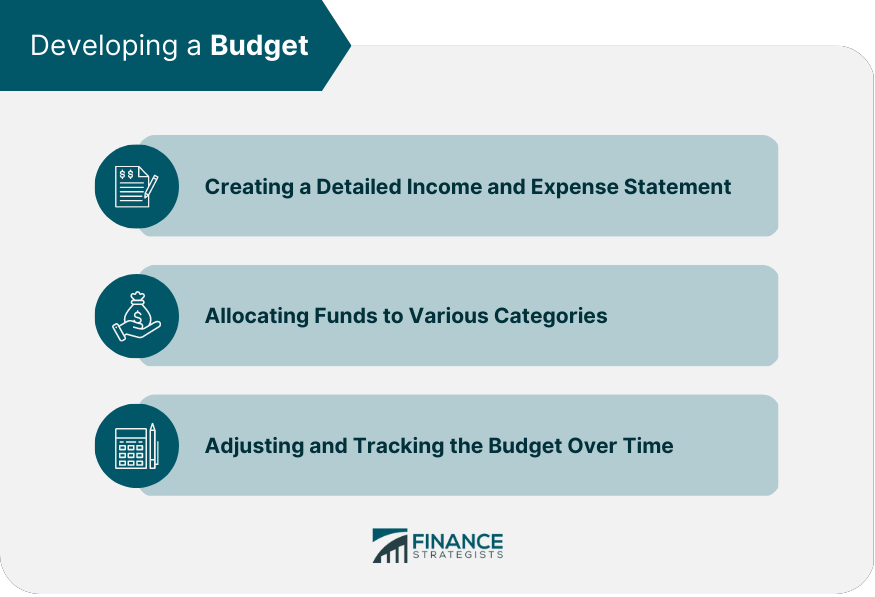Financial plan development is the process of creating a comprehensive financial roadmap that outlines your short and long-term financial goals, and the strategies and tactics required to achieve them. It involves analyzing your current financial situation, identifying potential risks and challenges, and developing a plan to achieve your financial goals. A well-designed financial plan takes into consideration your income, expenses, debts, savings, investments, and other financial aspects of your life. It includes strategies for managing cash flow, minimizing taxes, investing for retirement, protecting your assets, and achieving other financial objectives. The process of financial plan development may involve working with a financial advisor or planner, who can help you create a plan that aligns with your unique needs and circumstances. Financial goals can be categorized into short-term (less than one year), medium-term (one to five years), and long-term (more than five years) objectives. Identifying and prioritizing these goals helps in creating a roadmap for achieving them. It is essential to determine the specific financial objectives for personal or business growth. This may include buying a house, starting a business, or planning for retirement. Once the goals are identified, they need to be prioritized based on their importance and feasibility. This helps in allocating resources and time effectively. To develop a financial plan, one must gather relevant financial data, including income sources, assets and liabilities, and expenses. Financial data analysis includes calculating financial ratios, assessing cash flow, and determining net worth. This information helps in identifying areas that need improvement and making informed decisions. A budget is a financial plan that allocates funds to various categories based on anticipated income and expenses. Creating a detailed expense and income statement is the first step in developing a budget. Once the income and expenses are estimated, funds must be allocated to various categories, such as housing, transportation, savings, and investments. A budget should be flexible and adjustable, as financial situations can change. Regularly tracking the budget helps in staying on track with financial goals. Saving and investing are crucial for accumulating wealth and achieving financial goals. These strategies help in growing money over time and ensuring financial security. Understanding one's risk tolerance and investment objectives is essential for developing an appropriate investment strategy. Diversifying investments and allocating assets helps in managing risk and optimizing returns. Various investment options, such as stocks, bonds, mutual funds, real estate, and retirement accounts, should be evaluated based on their potential returns and risks. A comprehensive financial plan should address potential risks and vulnerabilities that could impact financial goals. Insurance policies, such as life, health, property, and casualty insurance, help in managing risks and protecting against financial losses. A risk management plan outlines strategies for mitigating risks and managing unforeseen events. Tax planning involves understanding the tax consequences of financial decisions and identifying tax-saving opportunities. Strategies for minimizing tax liabilities should be incorporated into the financial plan, ensuring compliance with tax laws and regulations. Retirement planning involves estimating the income needed to maintain a desired lifestyle during retirement. A retirement savings strategy outlines the steps needed to accumulate the required funds for retirement. Various sources of retirement income, such as Social Security, pensions, and investment accounts, should be identified and evaluated based on their potential to provide the necessary funds during retirement. Estate planning ensures that an individual's assets are distributed according to their wishes after their death, minimizing taxes and avoiding potential conflicts among heirs. Documents such as wills, trusts, and powers of attorney should be prepared to ensure proper management and distribution of assets. Incorporating strategies to minimize estate taxes, such as gifting assets and creating trusts, helps in maximizing the wealth transferred to heirs. Regularly reviewing and updating the financial plan ensures that it remains relevant and aligned with changing financial goals, market conditions, and life events. Monitoring progress towards financial goals helps in identifying areas that need improvement and adjusting the plan accordingly. Life events, such as marriage, divorce, or job changes, and fluctuations in market conditions may require adjustments to the financial plan to stay on track with financial goals. Choosing a financial advisor who understands one's financial goals, assess risk tolerance, and investment objectives is crucial for developing a personalized financial plan. Financial professionals, such as financial planners, investment advisors, and insurance agents, play different roles in the financial planning process. It is essential to understand their responsibilities and areas of expertise. Developing a long-term relationship with a trusted financial professional can help in navigating the complexities of financial planning and staying on track with financial goals. In summary, financial plan development is an essential process for individuals and businesses to achieve their financial goals and secure a stable financial future. By setting clear objectives, gathering and analyzing financial data, creating a budget, implementing saving and investment strategies, managing risks through insurance, planning for taxes, retirement, and estate, it is possible to establish a comprehensive and adaptable financial plan. Regularly monitoring and reviewing the plan ensures that it remains aligned with changing financial goals and circumstances. Working with a trusted financial professional can provide valuable guidance and support throughout the financial planning process, helping to navigate complexities and make informed decisions. Ultimately, a well-crafted financial plan serves as a roadmap to financial success and long-term security.What Is Financial Plan Development?
Setting Financial Goals
Short-Term, Medium-Term, and Long-Term Goals
Identifying Personal and Business Objectives
Prioritizing Goals and Determining Feasibility
Gathering and Analyzing Financial Information
Collecting Personal or Business Financial Data
Analyzing Financial Data
Developing a Budget
Creating a Detailed Income and Expense Statement
Allocating Funds to Various Categories
Adjusting and Tracking the Budget Over Time

Savings and Investment Strategies
Importance of Saving and Investing
Assessing Risk Tolerance and Investment Objectives
Diversification and Asset Allocation
Evaluating Investment Options
Risk Management and Insurance
Identifying Potential Risks and Vulnerabilities
Evaluating Insurance Needs
Developing a Risk Management Plan
Tax Planning and Strategies
Understanding Tax Implications of Financial Decisions
Identifying Tax-Saving Opportunities
Retirement Planning
Estimating Retirement Income Needs
Creating a Retirement Savings Strategy
Identifying and Evaluating Retirement Income Sources
Estate Planning
Importance of Estate Planning
Preparing Necessary Documents
Strategies for Minimizing Estate Taxes
Monitoring and Reviewing the Financial Plan
Importance of Regular Reviews
Assessing Progress Towards Financial Goals
Adjusting the Plan as Needed Based on Life Changes and Market Conditions
Working With Financial Professionals
Selecting the Right Financial Advisor
Understanding the Roles and Responsibilities of Financial Professionals
Building a Long-Term Relationship With a Trusted Advisor

Conclusion
Financial Plan Development FAQs
Financial plan development is the process of creating a comprehensive financial roadmap that outlines your short and long-term financial goals, and the strategies and tactics required to achieve them.
Financial plan development is essential because it helps you gain clarity on your financial goals and develop strategies to achieve them. It also helps you understand your current financial situation, identify potential risks and challenges, and prepare for any unexpected events.
Anyone who wants to achieve their financial goals can benefit from financial plan development, regardless of their income or assets. Whether you are just starting out in your career or preparing for retirement, having a well-thought-out financial plan can help you achieve your goals and secure your financial future.
A financial plan typically includes several key components, such as budgeting and cash flow management, retirement planning, investment planning, tax planning, estate planning, and risk management. The specific components of your financial plan will depend on your individual needs, goals, and circumstances.
While it is possible to develop a financial plan on your own, many people find it helpful to work with a financial planner or advisor who can provide expert guidance and advice. A professional can help you navigate complex financial issues, stay on track towards your goals, and adjust your plan as your circumstances change over time.
True Tamplin is a published author, public speaker, CEO of UpDigital, and founder of Finance Strategists.
True is a Certified Educator in Personal Finance (CEPF®), author of The Handy Financial Ratios Guide, a member of the Society for Advancing Business Editing and Writing, contributes to his financial education site, Finance Strategists, and has spoken to various financial communities such as the CFA Institute, as well as university students like his Alma mater, Biola University, where he received a bachelor of science in business and data analytics.
To learn more about True, visit his personal website or view his author profiles on Amazon, Nasdaq and Forbes.















